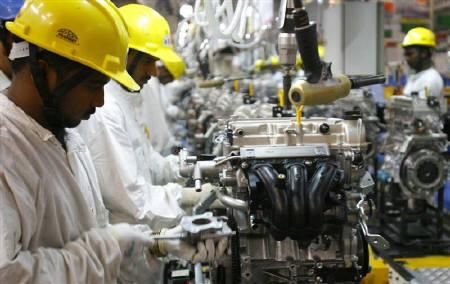 Speaking at an event organised by the Union labour ministry, Prime Minister Narendra Modi made some very important points about the direction in which his government should take policy.
Speaking at an event organised by the Union labour ministry, Prime Minister Narendra Modi made some very important points about the direction in which his government should take policy.
The prime minister said that the ease of doing business was an essential indicator of whether his "Make in India" campaign would succeed in reviving Indian manufacturing.
He also promised an end to the "inspector raj" that has long bedevilled Indian manufacturing.
Labour inspectors are among the fleets of bureaucrats who wield considerable power over Indian entrepreneurs.
On Thursday, Mr Modi revealed that there would henceforth be greater transparency in their decision-making - destinations for inspections would be decided randomly through an automated algorithm, and inspectors would have to file their reports within 72 hours, reducing the chances of harassment.
This is a welcome reform. But it simply does not go far enough.
Mr Modi is right that Indian business suffers under an inspector raj. But introducing technological quick fixes is not a substitute for changing the restrictive laws that continue to empower the inspectors.
As long as the laws that are the source of harassment are still on the books, it will be possible for intelligent people to out-think the various technological solutions being suggested.
Nor is a computerised process in any way the real big-bang labour reforms that economists urge India to undertake.
What is needed is to ensure that factor markets, especially for labour, are more flexible.
Factoryowners must be convinced that India's laws no longer make an additional employee more of a burden in terms of paperwork or of future responsibility than they are a source of productivity increase.
When that happens, then labour employment in the formal sector will increase in the way the prime minister has been promising.
"Make in India" requires deeper structural reforms. Unfortunately, what was on offer at the Union labour ministry's event on Thursday was a disappointment - many of the ideas announced there were rehashed and rebranded old schemes. Mr Modi's speech indicated that he understood the problems.
It is a pity that his government has, however, not yet moved to address them.
Certainly, some of the changes will help, if carried out as promised - reducing the complexity of the compliance paperwork that companies have to maintain, for example.
But it is important to note that many states already have online compliance.
The number of forms is merely a symptom, and attacking a symptom is usually futile.
The disease is the laws themselves, which add unnecessarily to the costs of business in India. Some states, such as Rajasthan, Haryana and Madhya Pradesh, have indicated their willingness to do away with the more onerous laws.
This requires the Centre's consent - consent that has still not been granted to Rajasthan's legislative amendments, in a puzzling delay.
The prime minister, in his speech, seemed to indicate that he grasped the importance of labour law. He has certainly convinced most observers that his focus is the revival of labour-intensive manufacturing in India.
But repackaging old laws or technological tweaks is not the way to go about it.











